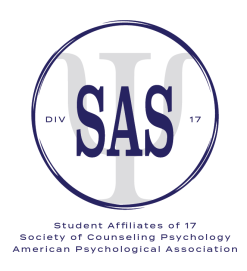I don’t quite fit into the typical box as a counseling psychology student in my program. I haven’t shared many of the experiences other students in my program have had. I am interested in youth mental health so my research experience has been mainly based in schools with school psychologists, and my practicum training has been more connected with the university’s clinical department. Many times in my practicum or on my research team, I am the only counseling psychology student in the room. Occasionally it has felt intimidating and I have felt out of place, not only in settings outside of counseling psych, but also within the program, given I have had different experiences. But reflecting on my training in graduate school thus far, I think these opportunities to work on interdisciplinary teams and collaborate with students, faculty, and professionals in clinical and school psychology as well as in fields outside of psychology have been invaluable to my experience. I am fortunate that my advisor has modelled a value for collaboration in his research as most of his work in prevention science and youth mental health is interdisciplinary with many departments within the university, like clinical psychology and social work, and practitioners in the community. I am grateful to my advisor’s support in exploring these opportunities and to the supervisors who have welcomed me onto their clinical and research teams.
In my experience there are many benefits to having practicum and research experiences with students and faculty outside of counseling psychology. First, it has challenged and expanded my ways of thinking about research and practice. I have had some cool experiences that I would’ve otherwise missed out on—like working in schools, getting exposure to different types of standardized assessment, and teacher consultation that relates to youth mental health at a more systems level. I have also been challenged to come to a better understanding of my own ideas by having the opportunity to discuss things formally and informally with students and faculty from other departments. Second, as a student in counseling psychology, my unique training and expertise brings a valuable perspective to collaborative teams. For example, I’ve found that students from clinical and school psychology look to counseling psychology students as experts in multicultural counseling, and it is beneficial to have the opportunity to share resources and this perspective with other students in psychology who may not have this emphasis as part of their programs. Third, the experience of working with others from different trainings and backgrounds is important preparation for work on internship and after graduation. In many ways there are more similarities than there are differences among the divisions in psychology in terms of the type of things psychologists can do after graduation. Fourth, I’ve found that working in collaboration is especially helpful for specializing with a particular population or research area. In my experience, this has been the major benefit of seeking opportunities for practicum and research outside of my counseling psychology program. My interest with youth mental health aligns strongly with the work of school psychologists as well as clinical psychologist with a child focus, and in the end we can all do similar types of research and practice with the goal of supporting youth mental health.
My advice to counseling psychology students is to enrich your education with opportunities to develop an identity as a counseling psychologist, but don’t limit yourself to interactions with only those students and faculty in your program. Seek out research and practicum opportunities that involve collaboration and interdisciplinary teams. There may be many different opportunities for collaboration in both research and in practice. Clinical, school, and counseling psychology programs share the science-practitioner model and have unique strengths and perspectives that can provide opportunities for collaboration. There are also other disciplines within psychology like developmental, social, neuropsychology, etc. that could have overlapping areas of focus. Outside the field of psychology, having experience working with psychiatrists, social workers, school counselors, and even policy-makers can support coordination of clinical practice and advocacy, and it can enrich research by having multiple stakeholders involved.
I know in many ways this can be easier said than done. It can be intimidating and overwhelming to find a practicum or research team outside of the traditional avenues for counseling psychology students. My advice would be to just ask – the worse that can happen is someone says no. Not only can it be anxiety-provoking to seek out a new opportunity, but it may be hard to break into a new area as it can be easier to make connections through the counseling psychology department. One suggestion to make connections outside of your program is to attend presentations on campus from different programs and departments or even explore course opportunities and electives outside of your department. As graduate students, we all have a lot going on with courses, clinical work, research, and teaching, and it can be hard to add something else; however, thinking outside of the box can deepen your experience and can be great preparation for a career after graduation. There is not one right way to complete a counseling psychology program – find what works best for you!
Colleen Eddy is a fourth year doctoral candidate in counseling psychology at the University of Missouri, Columbia. She is the SAS regional coordinator for Region 3.
To download the PDF version of this document, click here: Thinking Outside the Counseling Psychology Box
